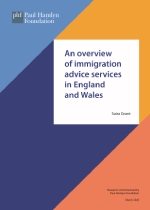Spreading and scaling – learning from diverse models
On the afternoon of Friday 11 April, the Foundation’s Social Justice programme held a small grantee learning seminar on the theme, ‘Spreading and Scaling: Good practice and lessons learned’. The aims of the event were for the Foundation to learn from grantees’ experiences, to connect grantees with each other, and to tap into growing levels of specialist sector expertise that are becoming available on this topic.
The session was deliberately short, informal and small, with just five grantee representatives joining Foundation grants staff and Dan Berelowitz, Chief Executive and Co-founder of the International Centre for Social Franchising. All of the invited organisations are currently funded by PHF to grow their work, and all have either replicated or are in the process of doing so. Hence there was an impressive level of knowledge and experience of the topic in the room.
Dan Berelowitz kicked off the session with a short presentation on ‘end games‘ for spreading and scaling, using his own expert knowledge of supporting organisations to replicate. He was followed by Gracia McGrath, Chief Executive of Chance UK, which set up its first social franchise in 2004, who shared a few of the lessons Chance UK has learned over the last decade. This prompted an engaging discussion about social franchising, key factors for growth and what very diverse organisations can learn from each other’s practice.
Dan Berelowitz has written an article for us on replication.
A few things were striking – firstly, the diversity of the paths that grantees have taken to growth, even within this small group. While the group included social franchisers, others had replicated directly, taken a partnership approach or sought to get the government to adopt their approach. Indeed a single organisation may pursue different strategies at different times or for different areas of work. To illustrate this diversity, we have listed brief information about participating organisations’ strategies below.
Whichever model was pursued, at least three things came through as fundamentally important. A common factor across all organisations was the need for good relationships with the people growing the business, and the associated importance of investing significant time, effort, and potentially money, in recruitment, training and ongoing communication. As partners/franchises/staff will be representing the growing organisation’s brand, the recruitment bar should be similar to if they were being recruited directly.
Gracia highlighted the need to constantly ask, “Why do we do this?” with your work’s outcomes in mind, to clarify which aspects of your ‘product’ are important to its success. As a charity ‘product’ is translated into different organisations, geographies and so on, there will be constant requests and pressures to adapt and be flexible; by asking this question, organisations can identify what is negotiable and what isn’t.
Finally, everyone present mentioned quality as an ongoing preoccupation, whatever the strategy for growth. In extremis, this requires a willingness to end a partnership that is not delivering to the required standard or not staying sufficiently faithful to the original model – two of the five organisations present have experience of this. More routinely it is a need for ongoing monitoring and conversation to ensure high standards and continuous improvement. From PHF’s point of view, it is not a coincidence that organisations with this commitment to quality are those we have funded to grow.
There is much more that could be said on this topic, and this session was necessarily only scratching the surface. Those present have expressed interest in following up in six months time to see what happened next; they are also willing to be contacted by other PHF grantees wanting to know more. It is also a rare organisation that would not benefit from the kinds of professional support to replicate offered by the ICSF.
This seminar was one of a potential mini-series for social justice grantees. It takes advantage of the knowledge and experience of our existing grantee cohort to share learning on topics of common interest. Possible future sessions include social enterprise/income generation; succession planning; influencing policy; commissioning; standards of evidence and prevention/early intervention.
Please contact Susie Dye to find out more and follow up.
Participating organisations
Dan Berelowitz, Chief Executive, International Centre for Social Franchising
Dan co-founded the ICSF in 2011 based on his experiences working across a range of social sector organisations, partly out of a sense of frustration at seeing transformational community projects reinventing the wheel and failing to scale up and replicate. The Centre aims to assist 10 social solutions to replicate in four years.
Gracia McGrath, Chief Executive, Chance UK
Chance UK provides mentoring programmes for children aged 5-11 years with behavioural difficulties. It was one of the first UK programmes to offer solution-focused early intervention mentoring, and one of the first to use social franchising. Chance UK delivers its programmes directly across seven London boroughs as well as working with five social franchise partners across the UK.
Tim Snowdon, Chief Executive, Changing Tunes
Changing Tunes uses music teaching, rehearsing, recording, performance, improvisation and composition to aid the rehabilitation of prisoners and ex-prisoners. It offers support both in custody settings and in the community, working through church and other volunteer community networks. Originally started in the West Country, Changing Tunes has opened two social franchises, which it aims to grow to six by 2020.
Andrew Radford, Managing Director, Coram Voice
Coram Voice works with vulnerable children and young people, particularly those involved with the care system, to enable their voices to be heard through providing advocacy and campaigning for system change. In 2012, the then ‘Voice for the Child in Care’ amalgamated to become part of the Coram family of charities. It is currently developing its ‘Bright Spots’ research, which seeks to identify and spread good practice in local authorities’ listening to young people.
Rebecca McHugh, Group Monitoring and Evaluation Manager, Fight for Peace
Fight for Peace uses boxing and martial arts combined with education and personal development to realise the potential of young people in communities that suffer from crime and violence. Originally started in Rio de Janeiro, Fight for Peace opened in East London in 2007. Its Global Alumni Programme is replicating Fight for Peace’s ‘five pillars’ model through partners internationally and in Brazil; the UK Alumni Programme will develop this same partnership model in 10 UK cities.
Fiona Pienaar, Head of Clinical Services, Place2Be
The Place2Be is the leading UK provider of school-based mental health support. Its practitioners deliver in over 200 schools across the UK. The Place2Be has grown through its services being commissioned by local authorities and schools. Place2Be is also a recognised provider of specialist training and Professional Qualifications, offering a full suite of accredited training courses, ranging from a Level 2 Award in Counselling Skills for Working with Children to a Postgraduate Diploma and Masters in Counselling Children in Schools. Place2Be delivers consultancy support; advice; and professional development and training to those who work with children and families, including teachers and a wide range of school staff; school nurses; children’s centre staff; police; housing association staff; foster carers; social workers; family support workers; and many others. In the past year the total amount of trainees exceeded 3,000 people.
All are happy to be contacted to share learning from their experiences.



